
Self-Paced Courses
Most of these courses are designed for staff in primary and post-primary schools, while some are also suitable for early childhood and further education and training settings. One course, Supporting professional practice through mentoring in early childhood education settings (SP12) is designed specifically for staff in this sector that host our students on placement. All of these courses are online and self-paced taking between 3-4 hours to complete. A certificate of completion will be issued upon full completion of these self-paced courses. These courses are developed by Institute of Education Teacher Fellows with support from DCU Studio.
Enrolment Details: Please note that the process of enrolment for self-paced courses is different from the process of enrolment for live courses (on-campus and Via Zoom). All the details for course enrolment are circulated to eligible placement settings at the start of each academic year. The self-paced courses are available on the DCU LOOP platform.
| Course Code | Course Titles | Course Category |
|---|---|---|
| SP1 | Technology in education | PP |
| SP2 | An introduction to formative assessment | PP |
| SP3 | Creativity in education | PP |
| SP4 | Creative writing groups | PP |
| SP5 | Integrating STEM | P |
| SP6 | Sustainable development goals through STEAM | P |
| SP7 | Positive mental health in the classroom | P |
| SP8 | Ethical education in an Educate Together classroom | P |
| SP9 | Instructional strategies | P |
| SP10 | Supportive learning environments | P |
| SP11 | Universal design for learning | ECE, P, PP, FET |
| SP12 | Supporting professional practice through mentoring in early childhood education settings | ECE |
| SP13 | Developing podcasts to support student learning | ECE, P, PP, FET |
| SP14 | Web tools, settings and literary texts | ECE, P, PP, FET |
| SP15 | Meaningful Mathematics | P |
| SP16 | Playful problem-solving | P |
| SP17 | The new Learn Together Curriculum | P |
| SP18 | Working with parents/ guardians | P |
| SP19 | Speech, language and communication needs | ECE, P |
| SP20 | Supporting students with autism | P, PP |
| SP21 | School self-evaluation | P, PP |
| SP22 | Teaching and learning in multigrade classrooms | P |
| SP23 | From Play to Pedagogy: Facilitating Drama Across Primary Classes | P |
| SP24 | Music in Junior Primary Classrooms | P |
| SP25 | Beginning Reading: The Bigger Picture | P |
| SP26 | Instructional Strategies for Word Recognition | P |
| SP27 | Learning to Learn in the Classroom | PP |
| SP28 | Promoting Student Reflection in the Post-primary Classroom | PP |
| SP29 | Bullying Prevention Training Course - Part 1 | P, PP |
| SP30 | Bullying Prevention Training Course - Part 2 | P, PP |
| SP31 | The Role of the Year Head in Post-Primary Schools | PP |
| SP32 | Aspiring Assistant Principal 1&2 | PP |
Key: ECE - Early Childhood Education | P - Primary | PP - Post Primary | FET - Further Education & Training
Course Details
SP1: Technology in education
| Duration | 3-4 hrs |
| Course Developer | Avril Egan |
| Format | Self-Paced, Online |
| Suitable for | Post-Primary |
Course Outline
This course, combining both the theory and practice of technology in education, is most suitable for educators in post-primary settings.
Throughout this course, you will cover four topics:
- Gamification
- Integrated Technology
- Edtech Tools and Applications
- Accessibility and Inclusion
Profile of Course Leader
Avril Egan is a Teacher Fellow in DCU-IoE. She is currently on a career break from Coláiste Bhaile Chláir where she holds Assistant Principal 1 post for Teaching and Learning. Coláiste Bhaile Chláiris a Microsoft Showcase school where there is an emphasis on technology and Avril has been using technology in her practice as a French and English teacher since joining the school. Avril has worked with a number of educational bodies including Junior Cycle for Teachers and has completed a Masters in School Leadership. She is currently going into year two of her PhD in DCU, focusing on Leadership for Professional Learning.

SP2: An Introduction to formative assessment
| Duration | 3-4 hrs |
| Course Developer | Avril Egan |
| Format | Self-Paced, Online |
| Suitable for | Post-Primary |
Course Outline
This course combines both the theory and practice of key elements of formative assessment. This course is most suitable for educators starting out in their careers.
The four topics you will explore are:
- Engaging learners
- Effective questioning
- Effective feedback
- Independent learners
Profile of Course Leader
Avril Egan is a Teacher Fellow in DCU-IoE. She is currently on a career break from Coláiste Bhaile Chláir where she holds Assistant Principal 1 post for Teaching and Learning. Coláiste Bhaile Chláiris a Microsoft Showcase school where there is an emphasis on technology and Avril has been using technology in her practice as a French and English teacher since joining the school. Avril has worked with a number of educational bodies including Junior Cycle for Teachers and has completed a Masters in School Leadership. She is currently going into year two of her PhD in DCU, focusing on Leadership for Professional Learning.

SP3: Creativity in education
| Duration | 3-4 hrs |
| Course Developer | Emma Gallagher |
| Format | Self-Paced, Online |
| Suitable for | Post-Primary |
Course Outline
This course provides an overview of key themes and thinking about creativity in education. It blends the theory of creativity with suggestions for practical application of theory in practice. Throughout this course, participants will be invited to keep a reflection log.
After completing this course, participants will be able to:
- Explain your personal values and beliefs about creativity
- Define your personal understanding of creativity
- Understand and critique creative myths and note their relevance to education
- Plan for creativity in the classroom
- Design creative tasks and assessment
Profile of Course Leader
Emma Gallagher is a Teacher Fellow at DCU IOE. She is a teacher of Gaeilge and English and a former team leader of Junior Cycle English with JCT. She has a MSc in Education and Training Management specialising in e-learning, and MA in Creative Writing. She is currently undertaking doctoral studies with a focus on creativity in lower secondary education in Ireland.

SP4: Creative writing groups
| Duration | 3-4 hrs |
| Course Developer | Emma Gallagher |
| Format | Self-Paced, Online |
| Suitable for | Post-Primary |
Course Outline
This course provides an introduction to establishing creative writing groups. This course, combining theoretical and practical understandings of creative writing groups, is suitable for educators in post-primary settings although educators across early years, primary and further education sectors may enjoy the opportunity to develop their creative writing through a creative writing journal. The course is divided into four topics.
The four topics are:
- Getting started and Freewriting
- The Amherst Writers & Artists workshop method
- The Writer's Workshop Method
- The Fighting Words Workshop
Profile of Course Leader
Emma Gallagher is a Teacher Fellow at DCU IOE. She is a teacher of Gaeilge and English and a former team leader of Junior Cycle English with JCT. She has a MSc in Education and Training Management specialising in e-learning, and MA in Creative Writing. She is currently undertaking doctoral studies with a focus on creativity in lower secondary education in Ireland.

SP5: Integrating STEM
| Duration | 3-4 hrs |
| Course Developer | Mairéad Holden |
| Format | Self-Paced, Online |
| Suitable for | Primary |
Course Outline
This course offers a range of practical playful ideas for ways to meaningfully integrate STEM across the curriculum. Participants will have the chance to explore and engage with rich tasks which aim to maximise learning with minimal equipment. On completion, this course will enable participants to:
- Critically engage with current research to enhance their understanding of what is meant by integrated STEM
- Reflect on their current practice in STEM through engaging in a range of thematic STEM projects
- Become familiar with a range of free resources and materials which can support the infusion of STEM pedagogies into their setting/context
- Develop a range of strategies to adapt STEM activities to ensure all learners are appropriately challenged
Profile of Course Leader
Mairéad Holden is a primary teacher and Teacher Fellow in the DCU IoE, based in the School of STEM Education, Innovation & Global Studies. Her Masters thesis focused on supporting the development of STEM skills and dispositions for struggling learners in DEIS primary schools. She holds a post-graduate certificate in 21st Century Teaching & Learning and has recently published work in the area of STEM literacy for young learners. She is currently engaged in doctoral research on the use of online Lesson Study. Mairéad is a former PDST Primary STEM curriculum advisor and has led a variety of collaborative education projects including with Science Foundation Ireland, the Primary Science Teachers’ Trust, and the European Space Agency.
SP6: Sustainable Development Goals through STEAM
| Duration | 3-4 hrs |
| Course Developer | Mairéad Holden |
| Format | Self-Paced, Online |
| Suitable for | Primary |
Course Outline
This course introduces participants to the UN Sustainable Development Goals (SDGs) and explores ways to facilitate pupils in the primary classroom to creatively engage with global citizenship issues through an integrated STEAM lens. On completion, this course will enable participants to:
- Facilitate learners in primary classrooms to learn about the UN Sustainable Development Goals (SDGs) using a variety of creative STEAM-based approaches
- Become familiar with a range of free resources and materials on the UN Sustainable Development Goals (SDGs)
- Apply a critical and action-based approach to the teaching of global citizenship issues in their classroom and school context
Profile of Course Leader
Mairéad Holden is a primary teacher and Teacher Fellow in the DCU IoE, based in the School of STEM Education, Innovation & Global Studies. Her Masters thesis focused on supporting the development of STEM skills and dispositions for struggling learners in DEIS primary schools. She holds a post-graduate certificate in 21st Century Teaching & Learning and has recently published work in the area of STEM literacy for young learners. She is currently engaged in doctoral research on the use of online Lesson Study. Mairéad is a former PDST Primary STEM curriculum advisor and has led a variety of collaborative education projects including with Science Foundation Ireland, the Primary Science Teachers’ Trust, and the European Space Agency.

SP7: Positive mental health in the classroom
| Duration | 3-4 hrs |
| Course Developer | Patricia Burke |
| Format | Self-Paced, Online |
| Suitable for | Primary |
Course Outline
The aim of this course is to outline how wellbeing can be promoted in the primary classroom from Junior Infants through to Sixth Class with age appropriate activities and resources.
By the end of this course participants will:
- Examine why there is a need to address wellbeing in the classroom.
- Explore ways in which teachers can support their own wellbeing.
- Identify some school-wide initiatives that might be introduced to promote an atmosphere that addresses and promotes wellbeing.
- Explore topics such as colour, mindfulness, gratitude diaries and exercise and how these might be used in the classroom to support the wellbeing of students.
The course will combine practical classroom examples and research from experts in the field of wellbeing to help participants understand how they can support students and their own mental health.
Profile of Course Leader
Patricia Burke is one of the six Teacher Fellows working in the Institute of Education. Patricia is a primary Teacher Fellow and is a member of the School of Human Development. She is currently on career break from her school, Donabate Portrane Educate Together NS, where she has taught for six years. She has also worked in Le Chéile ETNS in Drogheda, as well as in Milan, Italy. Patricia is currently undertaking study at Masters level. She has a particular interest in Ethical Education and has delivered lectures on working in an Educate Together school as part of her position as a Teacher Fellow.

SP8: Ethical Education in an Educate Together classroom
| Duration | 3-4 hrs |
| Course Developer | Patricia Burke |
| Format | Self-Paced, Online |
| Suitable for | Primary |
Course Outline
The aim of this course is to investigate ethical questions that can be explored in the primary classroom through the lens of each of the four strands of the current Learn Together Curriculum- Ethics and the Environment, Equality and Justice, Belief Systems and Moral and Spirituality.
At the end of this course, participants will be able to:
- Define ethical education.
- Explore the Learn Together curriculum and strand units.
- Investigate different ways to integrate ethical education into primary classrooms.
- Create a culture of critical thinking in the classroom.
- Explore the Ethics and the Environment, Equality and Justice, Belief Systems and Moral and Spirituality strands in detail.
- Explore resources and ideas to aid in the teaching of all four strands.
The course looks at why there is a need to explore these issues in the primary classroom and how they can be explored in an age appropriate manner.
Profile of Course Leader
Patricia Burke is one of the six Teacher Fellows working in the Institute of Education. Patricia is a primary Teacher Fellow and is a member of the School of Human Development. She is currently on career break from her school, Donabate Portrane Educate Together NS, where she has taught for six years. She has also worked in Le Chéile ETNS in Drogheda, as well as in Milan, Italy. Patricia is currently undertaking study at Masters level. She has a particular interest in Ethical Education and has delivered lectures on working in an Educate Together school as part of her position as a Teacher Fellow.
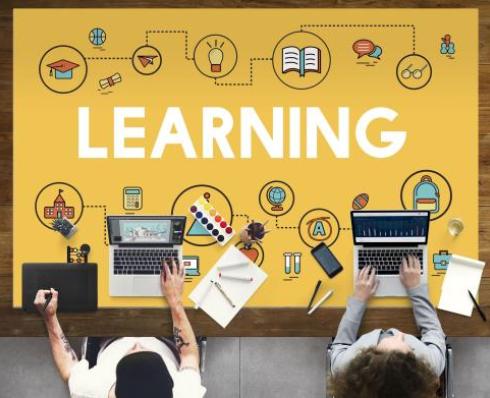
SP9: Instructional strategies
| Duration | 3-4 hrs |
| Course Developer | Ronan Gubbins |
| Format | Self-Paced, Online |
| Suitable for | Primary |
Course Outline
This course aims to provide participants with knowledge and skills for use in your professional practice with an emphasis on instructional approaches. The course draws on theory from the field of learning and development science to present practical approaches for teaching and learning.
On completion of the module, participants will be enabled to:
- Understand that learning and development are influenced by instructional approach
- Examine inquiry-based learning and explicit learning as instructional strategies
- Explore the possibilities that collaborative learning provides as an instructional approach
- Develop an appreciation of differentiated instruction
Profile of Course Leader
Ronan Gubbins is a Teacher Fellow at DCU IOE and currently on career break from his role as Deputy Principal and teacher in St. Cillian’s National School, Bluebell, Dublin. Here he taught in a multi-grade DEIS 1 primary context. He has completed a Masters in Applied Linguistics in Mary Immaculate College, Limerick and is currently completing a PhD in Education at DCU.

SP10: Supportive learning environments
| Duration | 3-4 hrs |
| Course Developer | Ronan Gubbins |
| Format | Self-Paced, Online |
| Suitable for | Primary |
Course Outline
This course aims to provide you with knowledge and skills for use in your professional practice with a focus on learning environments. The course presents what we know about learning environments and explores ways of creating, building, and maintaining supportive learning environments.
On completion of the module, you will be enabled to:
- Understand the role of learning environment in relation to student learning and development
- Explore the characteristics of a supportive learning environment
- Understand fundamental approaches to create and embed a supportive learning environment
- Appreciate longer term approaches to maintaining learning environment
Profile of Course Leader
Ronan Gubbins is a Teacher Fellow at DCU IOE and currently on career break from his role as Deputy Principal and teacher in St. Cillian’s National School, Bluebell, Dublin. Here he taught in a multi-grade DEIS 1 primary context. He has completed a Masters in Applied Linguistics in Mary Immaculate College, Limerick and is currently completing a PhD in Education at DCU.
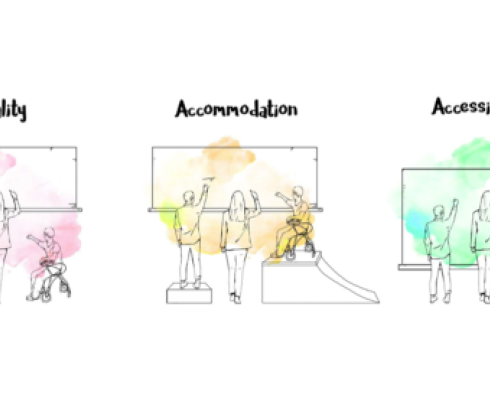
SP11: Universal design for learning
| Duration | 3-4 hrs |
| Course Developer | Ruth Thomas |
| Format | Self-Paced, Online |
| Suitable for | Early Childhood Education, Primary, Post-Primary, Further Education & Training |
Course Outline
This course outlines how Universal Design for Learning as a framework can support the inclusion of all learners. We talk you through the ‘why’, the ‘what’ and the ‘how’ when exploring UDL, its guidelines and principles, multiple means of expression, representation and engagement and how they can translate into your classroom practice. UDL is not implemented in a silo and after the course, your understanding will support your teaching methods and help you as you plan to remove the barriers to learning that can exist in classrooms.
Profile of Course Leader
Ruth Thomas is a DCU Teacher Fellow and has a B.Ed in primary education, a post-graduate diploma in special education, and a post-graduate diploma in school leadership. She is currently completing her Master's in Special Educational Needs. Prior to her work as a Teacher Fellow, Ruth worked across the domains of teaching from special schools, special classes and mainstream settings. She has worked as part of a multidisciplinary team in a class for ASD, and a class for Specific Speech and language disorders and brings this collaborative practice into her role and her research. She also worked closely with Drumcondra and Dublin West Education Centre as a creative cluster coordinator, achieving a digital school of distinction award and engaging in many creative initiatives.

SP12: Supporting professional practice through mentoring in early childhood education settings
| Duration | 5-6 hrs |
| Course Developer | Aishling Silke |
| Format | Self-Paced, Online |
| Suitable for | Early Childhood Education |
Course Outline
This course will support participants to develop and enhance their mentoring skills. The aim is to create a toolkit that educators/teachers can draw from in order to support them in their mentoring role. The course is divided into three sections. The first section considers our understanding of mentoring and how our values impact our mentoring style. The second section moves into effective mentoring, how to develop relationships, the importance of communication and approaches to providing feedback. In the final section we delve a little deeper into factors that impact mentoring including the issue of power and managing change. This course is a must for anyone who supports students during professional practice or supports the induction of new educators/teachers into an organisation.
Profile of Course Leader
Aishling Silke….

SP13: Developing podcasts to support student learning
| Duration | 3-4 hrs |
| Course Developer | Emma Gallagher |
| Format | Self-Paced, Online |
| Suitable for | Early Childhood Education, Primary, Post-Primary, Further Education & Training |
Course Outline
This course focuses on developing podcasts to support student learning. After completing this course, you will be able to:
- Define what a podcast is.
- Understand the educational potential of podcasts.
- Develop a plan to create a podcast.
- Storyboard and script a podcast.
- Create optimal conditions for recording audio.
- Record and edit a podcast using Spotify for Podcasters.
- Create and share audiograms to promote their podcasts.
Profile of Course Leader
Emma Gallagher is a Teacher Fellow at DCU IOE. She is a teacher of Gaeilge and English and a former team leader of Junior Cycle English with JCT. She has a MSc in Education and Training Management specialising in e-learning, and MA in Creative Writing. She is currently undertaking doctoral studies with a focus on creativity in lower secondary education in Ireland.

SP14: Web Tools, setting and literary texts
| Duration | 3-4 hrs |
| Course Developer | Emma Gallagher |
| Format | Self-Paced, Online |
| Suitable for | Early Childhood Education, Primary, Post-Primary, Further Education & Training |
Course Outline
This course is suitable for educators who teach literary texts across early years, primary, post-primary and further education sectors. After completing this course, you will be able to:
- Learn how to use a variety of web tools to support students to develop an understanding of setting in literary texts
- Search for and identify poetry that will support students understanding of setting
- Identify key moments in texts that link to setting
- Create a Google Earth Project that supports an understanding of physical setting at key moments in a literary text
- Search the newspaper archive and Wayback Machine
Profile of Course Leader
Emma Gallagher is a Teacher Fellow at DCU IOE. She is a teacher of Gaeilge and English and a former team leader of Junior Cycle English with JCT. She has a MSc in Education and Training Management specialising in e-learning, and MA in Creative Writing. She is currently undertaking doctoral studies with a focus on creativity in lower secondary education in Ireland.

SP15: Meaningful Mathematics
| Duration | 3-4 hrs |
| Course Developer | Dr. Mairéad Holden |
| Format | Self-Paced, Online |
| Suitable for | Primary |
Course Outline
This course comprises four topics and aims to develop your understanding of what is meant by mathematical proficiency, why it’s important and how to facilitate meaningful mathematics learning experiences with the learners in your classroom. After completing this course, you will be able to:
- Develop your understanding of what is meant by mathematical proficiency
- Implement inclusive mathematics activities and pedagogical approaches within your own class context which promote the development of pupils’ mathematical proficiency
Profile of Course Leader
Dr. Mairéad Holden is a primary teacher and Teacher Fellow in the DCU IoE, based in the School of STEM Education, Innovation & Global Studies. Her Masters thesis focused on supporting the development of STEM skills and dispositions for struggling learners in DEIS primary schools. She holds a post-graduate certificate in 21st Century Teaching & Learning and has recently published work in the area of STEM literacy for young learners. She has recently completed doctoral research on the use of online Lesson Study. Mairéad is a former PDST Primary STEM curriculum advisor and has led a variety of collaborative education projects including with Science Foundation Ireland, the Primary Science Teachers’ Trust, and the European Space Agency.

SP16: Playful problem solving
| Duration | 3-4 hrs |
| Course Developer | Dr. Mairéad Holden |
| Format | Self-Paced, Online |
| Suitable for | Primary |
Course Outline
This course comprises four topics and aims to develop your understanding of problem-solving within the context of the new Primary Mathematics Curriculum and how to facilitate playful problem-solving learning experiences with the learners in your classroom. Throughout this course, you will have the chance to explore and reflect on what it means to cultivate a productive classroom climate, where knowledge is shared, struggle is productive and mistakes are valued as opportunities for learning. After completing this course, you will be able to:
- Develop your understanding of the different aspects of the problem-solving process.
- Implement inclusive mathematics activities and pedagogical approaches within your own class context which promote the development of pupils’ mathematical proficiency.
Profile of Course Leader
Dr. Mairéad Holden is a primary teacher and Teacher Fellow in the DCU IoE, based in the School of STEM Education, Innovation & Global Studies. Her Masters thesis focused on supporting the development of STEM skills and dispositions for struggling learners in DEIS primary schools. She holds a post-graduate certificate in 21st Century Teaching & Learning and has recently published work in the area of STEM literacy for young learners. She has recently completed doctoral research on the use of online Lesson Study. Mairéad is a former PDST Primary STEM curriculum advisor and has led a variety of collaborative education projects including with Science Foundation Ireland, the Primary Science Teachers’ Trust, and the European Space Agency.

SP17: The new Learn Together primary curriculum
| Duration | 3-4 hrs |
| Course Developer | Patricia Burke |
| Format | Self-Paced, Online |
| Suitable for | Primary |
Course Outline
This course provides an introduction to the new Learn Together curriculum, comparing it to the previous curriculum and highlighting key similarities and differences. It covers the four stages of the curriculum, starting with Junior and Senior Infants, followed by 1st and 2nd Class, 3rd and 4th Class, and finally 5th and 6th Class. For each stage, sample activities are demonstrated, and additional resources are identified for further reference.After completing this course, you will be able to:
- Define Ethical Education.
- Examine the new curriculum and highlight key differences.
- Integrate ethical education into everyday classroom activities.
- Recognize the sixteen themes in Stage 1 and Stage 2, and explore associated lessons.
- Use a conceptual enquiry approach to teach the Belief Systems strand in each stage.
- Recognize the elements covered under the four strands in Stage 3 and Stage 4, and explore associated lessons.
- Use a conceptual enquiry approach to teach the Belief Systems strand in each stage.
Profile of Course Leader
Patricia Burke is one of the six Teacher Fellows working in the Institute of Education. Patricia is a primary Teacher Fellow and is a member of the School of Human Development. She is currently on career break from her school, Donabate Portrane Educate Together NS, where she has taught for six years. She has also worked in Le Chéile ETNS in Drogheda, as well as in Milan, Italy. Patricia is currently undertaking study at Masters level. She has a particular interest in Ethical Education and has delivered lectures on working in an Educate Together school as part of her position as a Teacher Fellow.

SP18: Working with parents and guardians of primary school children
| Duration | 3-4 hrs |
| Course Developer | Patricia Burke |
| Format | Self-Paced, Online |
| Suitable for | Primary |
Course Outline
This course provides an overview of key considerations when working with parents, including parents of a child with an additional need. It explores the importance of dialogue, formal and informal communication, building trust and meeting parents in person. Included in the course are some key research articles and videos, as well as resources that are available to support you as the teacher. Resources to support parents are also included. After completing this course, you will be able to:
- Develop an understanding of why working with parents is important.
- Explore how to build home-school relations by including and involving parents in school life.
- Apply different means of communicating with parents.
- Developed an understanding of the additional requirements when working with a child with AEN.
- Be familiar with resources and supports available to teachers and parents.
Profile of Course Leader
Patricia Burke is one of the six Teacher Fellows working in the Institute of Education. Patricia is a primary Teacher Fellow and is a member of the School of Human Development. She is currently on career break from her school, Donabate Portrane Educate Together NS, where she has taught for six years. She has also worked in Le Chéile ETNS in Drogheda, as well as in Milan, Italy. Patricia is currently undertaking study at Masters level. She has a particular interest in Ethical Education and has delivered lectures on working in an Educate Together school as part of her position as a Teacher Fellow.

SP19: Speech, language and communication needs
| Duration | 3-4 hrs |
| Course Developer | Ruth Thomas |
| Format | Self-Paced, Online |
| Suitable for | Early Childhood Education, Primary |
Course Outline
This course covers speech language and communication skills, their role in learning, behaviour, and social-emotional development, as well as the various disorders encompassed within this domain. It explores the typical stages of speech and language development in children, factors influencing language development, and the impact of speech and language disorders on learners. Additionally, it delves into speech disorders, offering strategies, assessment methods, and planning advice for supporting speech development in the classroom. The course also addresses receptive language skills and disorders, presenting practical approaches to support receptive language in the classroom. Furthermore, it focuses on expressive language skills and associated disorders, providing examples of areas of difficulty and offering practical teaching and planning support. After completing this course, you will be able to:
- Identify Speech, language, and communication skills.
- Understand the term Developmental Disorder (DLD) and its implications.
- Explore the relationship between language disorders, Speech Language Communication Needs, and DLD.
- Recognize the stages of typical speech and language development.
- Understand the impact of SLCN disorders on children's development and learning.
- Examine techniques, strategies, and support for promoting global language development in the classroom.
Profile of Course Leader
Ruth Thomas is a DCU Teacher Fellow and has a B.Ed in primary education, a post-graduate diploma in special education, and a post-graduate diploma in school leadership. She is currently completing her Master's in Special Educational Needs. Prior to her work as a Teacher Fellow, Ruth worked across the domains of teaching from special schools, special classes and mainstream settings. She has worked as part of a multidisciplinary team in a class for ASD, and a class for Specific Speech and language disorders and brings this collaborative practice into her role and her research. She also worked closely with Drumcondra and Dublin West Education Centre as a creative cluster coordinator, achieving a digital school of distinction award and engaging in many creative initiatives.

SP20: Supporting students with autism
| Duration | 3-4 hrs |
| Course Developer | Ruth Thomas |
| Format | Self-Paced, Online |
| Suitable for | Primary, Post-Primary |
Course Outline
The aim of this course is to gain a greater understanding of Autism and how it affects children in their daily life. This course provides an in-depth exploration of their sensory processing, communication and language development and behaviour management. This course gives practical examples of how to support and facilitate children with Autism through strategies and intervention programmes. After completing this course, you will be able to:
- Recognise the core differences and strengths in children with Autism
- Identify strategies to support the child's educational, social, communication and behavioural development.
- Learn how to develop individual profiles and programmes to support the child with Autism
Profile of Course Leader
Ruth Thomas is a DCU Teacher Fellow and has a B.Ed in primary education, a post-graduate diploma in special education and a post-graduate diploma in school leadership. She is currently completing her Master's in Special Educational Needs. Prior to her work as a Teacher Fellow, Ruth worked across the domains of teaching from special schools, special classes and mainstream settings. She has worked as part of a multidisciplinary team in a class for ASD, and a class for Specific Speech and language disorders and brings this collaborative practice into her role and her research. She also worked closely with Drumcondra and Dublin West Education Centre as a creative cluster coordinator, achieving a digital school of distinction award and engaging in many creative initiatives.
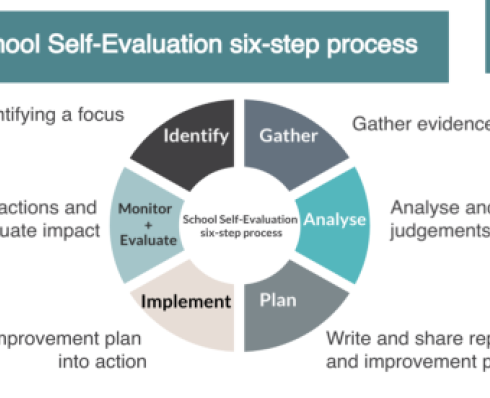
SP21: School self-evaluation
| Duration | 3-4 hrs |
| Course Developer | Ronan Gubbins |
| Format | Self-Paced, Online |
| Suitable for | Primary, Post-Primary |
Course Outline
This course provides a comprehensive overview of School Self-Evaluation (SSE) for Irish primary schools. The course begins by introducing some relevant background before focusing on the SSE process model and its application. The course concludes with some examples of SSE in action. After completing this course, you will be able to:
- Describe the purpose of SSE.
- Access and consider the relevant supporting documents for SSE.
- Understand the sequence of the six-step process model and define each step.
- Explore the possibilities that arise at each stage of the process
- Engage with examples of the process in action
Profile of Course Leader
Ronan is a Teacher Fellow at DCU IOE and currently on career break from his role as Deputy Principal and teacher in St. Cillian’s National School, Bluebell, Dublin. Here he taught in a multi-grade DEIS 1 primary context. He has completed a Masters in Applied Linguistics in Mary Immaculate College, Limerick and is currently completing a PhD in Education at DCU.

SP22: Teaching and learning in multigrade classrooms
| Duration | 3-4 hrs |
| Course Developer | Ronan Gubbins |
| Format | Self-Paced, Online |
| Suitable for | Primary |
Course Outline
This course explores teaching and learning in the multigrade context. The overall aim of the course is to provide teachers with knowledge and resources to successfully practise in a multigrade setting.
The course begins with some background relating to multigrade before progressing to the management and organisation of multigrade classrooms. Specific approaches to teaching and learning are then presented before considerations of planning and assessment are portrayed. After completing this course, you will be able to:
- Engage with relevant challenges and opportunities relating to multigrade teaching and learning in the Irish primary context
- Examine some useful teaching and learning approaches that are pertinent to this context
- Explore some key strategies for planning and assessment in multigrade.
Profile of Course Leader
Ronan is a Teacher Fellow at DCU IOE and currently on career break from his role as Deputy Principal and teacher in St. Cillian’s National School, Bluebell, Dublin. Here he taught in a multi-grade DEIS 1 primary context. He has completed a Masters in Applied Linguistics in Mary Immaculate College, Limerick and is currently completing a PhD in Education at DCU.
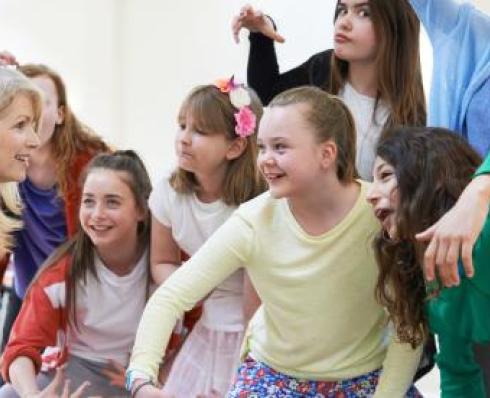
SP23: From Play to Pedagogy: Drama across the Primary Classes
| Duration | 3-4 hrs |
| Course Developer | Emma Farragher |
| Format | Self-Paced, Online |
| Suitable for | Primary |
Course Outline
This course aims to empower primary teachers with effective drama teaching strategies suitable for both junior and senior primary classes.
Through engagement with this course, participants will:
- Recognise the differences between process drama and product drama.
- Consider ways that enable them to create a supportive environment that nurtures pupils’ creativity and self-expression, affording pupils the opportunity to experiment with ideas, emotions, and narratives in a safe space.
- Participants will also be equipped with a repertoire of games and strategies as well as references for their own research that can be drawn on as they implement their learning in practice.
Profile of Course Leader
Emma Farragher is a primary teacher and teacher fellow at DCU Institute of Education where she is based in the school of Arts Education and Movement. She is a passionate advocate for the arts in education and supporting children in exploring and developing their innate creativity. Emma has a Masters in literacy from DCU IoE where her study focused on the supportive role of arts-based pedagogies in achieving literacy outcomes.

SP24: Music in the Junior Primary Classroom
| Duration | 3-4 hrs |
| Course Developer | Emma Farragher |
| Format | Self-Paced, Online |
| Suitable for | Primary teachers of junior primary classes |
Course Outline
This course aims to equip teachers of junior primary classes with a renewed understanding of musical concepts as outlined in the curriculum and pedagogical tools for supporting the development of these concepts with their classes.
Through engagement with the course, participants will be enabled to:
- Refresh their knowledge of musical concepts and identify ways of introducing these to junior primary classes.
- Consider effective methods and a variety of resources suitable for introducing ‘song-singing’ to young learners.
- Explore approaches to facilitating creative responses to music with their classes.
- Recognise the opportunities for the meaningful development of musical skills and concepts across subject disciplines.
Profile of Course Leader
Emma Farragher is a primary teacher and teacher fellow at DCU Institute of Education where she is based in the school of Arts Education and Movement. She is a passionate advocate for the arts in education and supporting children in exploring and developing their innate creativity. Emma has a Masters in literacy from DCU IoE where her study focused on the supportive role of arts-based pedagogies in achieving literacy outcomes.

SP25: Beginning Reading: the bigger picture
| Duration | 3-4 hrs |
| Course Developer | Rebecca Morrissey |
| Format | Self-Paced, Online |
| Suitable for | Primary |
Course Outline
This course comprises four topics and aims to develop your understanding of the Science of Reading. This course will consider the elements involved in learning to read and focus on the bigger picture of learning to read, outside of just phonics. Teacher knowledge is key when teaching children how to read and this course aims to equip you with some of the background knowledge and with some ideas to add to your teacher’s toolkit when engaging with beginning readers. After completing this course, you will be able:
- To recognise the ‘bigger picture’ with regards to beginning reading.
- To demonstrate an understanding of the elements involved in skilled reading.
- To identify what the alphabetic principle is and how it is used in the classroom.
- To recognise the ‘read aloud’ as a tool to maximise instructional density in
lessons.
Profile of Course Leader
Rebecca Morrissey is a primary teacher and Teacher Fellow in the DCU IoE, based in the School of Language, Literacy and Early Childhood Education. She is currently undertaking a Masters in Educational Literacy Professional Practices. Rebecca has taught in International settings and most recently, a DEIS school in Dublin. She is a Droichead mentor and enjoys supporting NQTs throughout the Droichead process. She is passionate about education and committed to educating the individual and setting children up for success.

SP26: Instructional Strategies for Word Recognition
| Duration | 3-4 hrs |
| Course Developer | Rebecca Morrissey |
| Format | Self-Paced, Online |
| Suitable for | Primary |
Course Outline
This course is underpinned by research and focuses on instructional strategies to support word recognition in the classroom. This course will consider phonological awareness, phonics, decoding, high-frequency words and decodable readers. Teacher knowledge is key and this course aims to equip you with some of the background knowledge and research informed strategies to support children with word recognition.
- To explore purposeful and practical ways to include phonological awareness in the classroom.
- To demonstrate an understanding in how to structure phonics lessons.
- To identify useful strategies for decoding instruction.
- To examine the strategies for supporting struggling readers.
Profile of Course Leader
Rebecca Morrissey is a primary teacher and Teacher Fellow in the DCU IoE, based in the School of Language, Literacy and Early Childhood Education. She is currently undertaking a Masters in Educational Literacy Professional Practices. Rebecca has taught in International settings and most recently, a DEIS school in Dublin. She is a Droichead mentor and enjoys supporting NQTs throughout the Droichead process. She is passionate about education and committed to educating the individual and setting children up for success.

SP27: Learning to Learn in the Classroom
| Duration | 4 hrs |
| Course Developer | Mary O'Donnell |
| Format | Self-Paced, Online |
| Suitable for | Post-Primary |
Course Outline
This course aims to give you a broad overview of ‘Learning to Learn’, examine where it is situated in the Irish post-primary curriculum and explore practical strategies for embedding it in classroom practice. After completing this course you will be able to;
- Define ‘Learning to Learn’ and explain how it links with the broader aims of
Junior Cycle. - State ways in which ‘Learning to Learn’ skills can be cultivated in the classroom.
- Describe practical classroom strategies for supporting the development of learning competencies.
Profile of Course Leader
Mary O’Donnell is a post-primary teacher of Chemistry and Mathematics, and an assistant principal I post holder. Mary has worked on the Professional Master of Education and other post-primary teacher education programmes, in both Maynooth University and DCU, for the past 8 years. She is currently working as a Teacher Fellow in the DCU IoE, based in the School of STEM Education, Innovation & Global Studies. Mary completed her Masters in educational leadership and her thesis explored the implementation of a ‘Learning to Learn’ model in a post-primary school. She holds a post-graduate certificate in 21st Century Teaching & Learning and she has collaborated with the NCCA and JCT around Junior Cycle implementation. Mary is currently completing her doctoral studies in the area of Science Education.

SP28: Promoting student reflection in the post-primary classroom
| Duration | 4 hrs |
| Course Developer | Mary O'Donnell |
| Format | Self-Paced, Online |
| Suitable for | Post-Primary |
Course Outline
This course aims to give you a broad overview of reflective practice and examine ways to promote and encourage both student and teacher reflection. After completing this course you will be able to;
- Define reflection and explain why it is a key element of teacher practice.
- Use two different models of reflective practice.
- Explain practical ways to develop students’ meta-cognitive skills in the classroom.
- Describe how to structure a classroom in a way that supports reflection.
Profile of Course Leader
Mary O’Donnell is a post-primary teacher of Chemistry and Mathematics, and an assistant principal I post holder. Mary has worked on the Professional Master of Education and other post-primary teacher education programmes, in both Maynooth University and DCU, for the past 8 years. She is currently working as a Teacher Fellow in the DCU IoE, based in the School of STEM Education, Innovation & Global Studies. Mary completed her Masters in educational leadership and her thesis explored the implementation of a ‘Learning to Learn’ model in a post-primary school. She holds a post-graduate certificate in 21st Century Teaching & Learning and she has collaborated with the NCCA and JCT around Junior Cycle implementation. Mary is currently completing her doctoral studies in the area of Science Education.

SP29: Bullying Prevention Training Course Part 1
| Duration | 3-4 hrs |
| Course Developer | Niall Farrell |
| Format | Self-Paced, Online |
| Suitable for | Primary, Post-Primary |
Course Outline
This course is the first part of a two-part series that aims to provide an introduction to the key concepts of bullying behaviour and bullying prevention within education settings.
It seeks to empower educators with the knowledge of the characteristics of bullying behaviour, supported by recent research and developments in the field. The course adopts a positive citizenship approach, designed to foster and promote positive social behaviours before bullying occurs that can bring about meaningful change in schools.
This training is designed to be practical, evidence-based and provide you with the tools needed to proactively address bullying in schools.
Profile of Course Leader
Niall Farrell is a post-primary teacher and Teacher Fellow in DCU Institute of Education and Anti-Bullying Centre. Niall holds a B.Ed. in Home Economics and Biology and M.Ed. in Social Justice Education. Niall is pursuing a PhD examining the lived experience of LGBTI+ teachers in navigating heteronormativity at post-primary level in Ireland. Niall is a former PDST Associate and has led and facilitated CPD in LGBTI+ awareness for teachers and youth workers nationally and internationally.

SP30: Bullying Prevention Training Course Part 2
| Duration | 3-4 hrs |
| Course Developer | Niall Farrell |
| Format | Self-Paced, Online |
| Suitable for | Primary, Post-Primary |
Course Outline
This course is the second part of a two-part series that aims to empower educators with the skills to create/progress a bullying prevention team within their schools. Building on your knowledge of bullying from Part 1 of the Bullying Prevention Training Course, Part 2 aims to provide practical guidance and advice on building a positive culture within your school to proactively tackle bullying.
Upon completion of this course, you will be equipped to lead a bullying prevention team within your school context. You will increase your knowledge of building a bullying prevention team, the roles and responsibilities of each member, reviewing your school’s anti-bullying policy and how to build a whole school community approach to bullying.
Profile of Course Leader
Niall Farrell is a post-primary teacher and Teacher Fellow in DCU Institute of Education and Anti-Bullying Centre. Niall holds a B.Ed. in Home Economics and Biology and M.Ed. in Social Justice Education. Niall is pursuing a PhD examining the lived experience of LGBTI+ teachers in navigating heteronormativity at post-primary level in Ireland. Niall is a former PDST Associate and has led and facilitated CPD in LGBTI+ awareness for teachers and youth workers nationally and internationally.
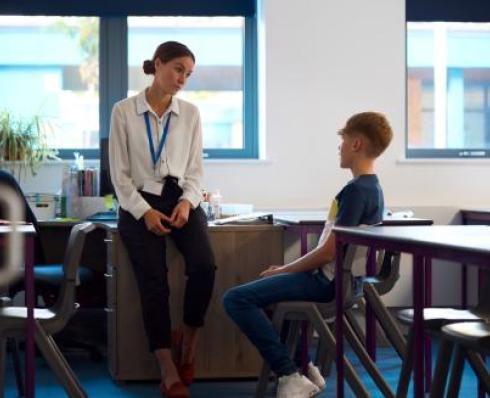
SP31: The Role of the Year Head in Post-Primary Schools
| Duration | 3-4 hrs |
| Course Developer | Stephen Dunne |
| Format | Self-Paced, Online |
| Suitable for | Post-Primary |
Course Outline
This course comprises four topics and aims to develop your understanding of the role of the year head in post-primary schools. It explores the many dimensions of the year head role and will support you in developing your own strategic plan as a year head. The presentation of course material is punctuated with moments for you to reflect and apply the learning to your own school context. After completing the course, you will be able to:
- Recognise the components of the year head role and to plan for and implement
- strategies to best support the students in your year group.
- Connect the year head role to the leadership structure of your school.
- Strategise the building of a culture of learning.
- Recognise the value of collaboration and communication in building working
- relationships and being an effective year head.
Profile of Course Leader
Stephen Dunne is a post-primary teacher of French and English and a Teacher Fellow in the IoE at DCU. He is an assistant principal 1 postholder with duties including year head, student voice and leadership, NQT mentor, SSE and literacy. Stephen completed his M.Ed comparing the development of key skills learning in formal and non-formal learning environments. He received the NAPD award for post-graduate Diploma in Educational Leadership (Tóraíocht) and is completing a doctoral degree in teacher education. Stephen’s research examines professional development for social justice education among newly qualified teachers.

SP31: Aspiring Assistant Principals 1 & 2
| Duration | 3-4 hrs |
| Course Developer | Stephen Dunne |
| Format | Self-Paced, Online |
| Suitable for | Post-Primary |
Course Outline
This course provides an overview of the roles of Assistant Principal 1 & 2. The four components of the course will support you in better understanding the roles and responsibilities of assistant principal post-holders in post-primary schools. It guides you through a distributed leadership model and uses the LAOS 2022 document to help you identify areas of leadership in your own practice, and to identify areas for potential leadership development in your school. The course is punctuated with moments which scaffold you to reflect on your own leadership journey. After completing this course, you will be able to:
- Recognise and describe the role of posts of responsibility in post-primary schools.
- Understand some of the characteristics of leadership that are desirable for an AP1&2.
- Know the content of, and engage with the LAOS 2022 document.
- Review your own strengths and competencies as you look to take on leadership roles within your school.
- Plan for future interview opportunities relevant to AP1&2 positions.
Profile of Course Leader
Stephen Dunne is a post-primary teacher of French and English and a Teacher Fellow in the IoE at DCU. He is an assistant principal 1 postholder with duties including year head, student voice and leadership, NQT mentor, SSE and literacy. Stephen completed his M.Ed comparing the development of key skills learning in formal and non-formal learning environments. He received the NAPD award for post-graduate Diploma in Educational Leadership (Tóraíocht) and is completing a doctoral degree in teacher education. Stephen’s research examines professional development for social justice education among newly qualified teachers.
